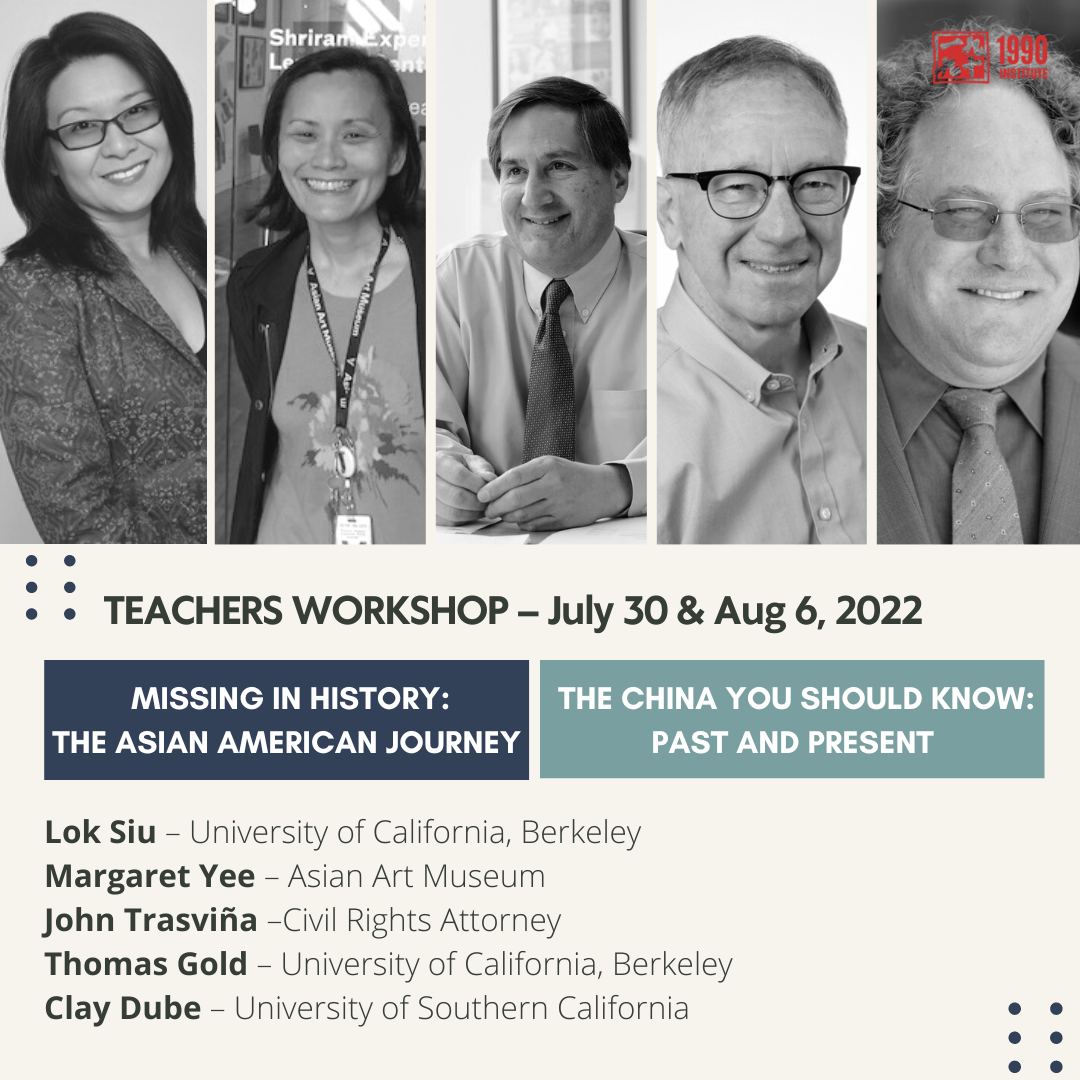| | | | Dear Friends, We had a wonderful turnout of teachers and lifelong learners for our two-day Teachers Workshop about Asian American history and the significance of China on the world today. These were particularly timely given the continuing violence against Asian Americans and Speaker Pelosi’s visit to Taiwan. Experts spoke about how China’s past influences the present and how the situation in Taiwan is moving the U.S. and China closer to military conflict. A very unfortunate state of affairs which will be detrimental to all citizens. The workshop recordings are available for all and provide really interesting information without political posturing. We also have a special profile of Asian American Civil War soldiers for our 100th post in our New Asian American Voices program. See more news in our Spotlight section below. Thanks for your continued support of the 1990 Institute and newsletter. Please share this newsletter with your friends and family and encourage them to subscribe. |
| |  |
|
| You can find the recordings here for all of our sessions on the Asian American journey and China today. |
| | How can education and data help us make connections across cultures and history? By Frances Kai-Hwa Wang My daughter and I just spent two days in Honolulu going to museums and eating Asian food. We go to the Bishop Museum one day and the Honolulu Museum of Art the next. We drive past Iolani Palace, the King Kamehameha statue, and the old Chinatown. We eat Japanese and Korean pastries, dim sum, Japanese sandos, Korean tacos, Singaporean laksa, and Eggs Benedict and Spam. We have a great time and never even make it to the beach. We stretch ourselves outside of our usual boxes to learn about Hawaiian, Pacific Islander, and other Asian cultures, to find commonalities and celebrate differences. Yet this feels particularly sobering with the news of the killings of four Shia Muslims in Albuquerque. The victims and alleged suspect were Afghan and Pakistani American, so this is an Asian American story. More information will be available by the time you read this, but tonight, Muslim American leaders are calling for more security at mosques and solidarity across sects. Last week, Pew Research Center released Being Asian in America, a survey based on dozens of focus groups with Asian Americans from the 18 largest Asian ethnic groups in America about their lives in America and their thoughts on identity. “I am an Indian American,” one immigrant man told Pew in Hindi. “Because I have been living here for so many years. It means I want to live here and I like the lifestyle here. If I have to go back to India, it will be very difficult for me.… I think if your mentality and thought have changed then you have become an Indian American. I feel that the compassion I have now become totally American in nature. Because that’s how I think. That’s why I think I am Indian American … you keep the accent aside.” Stop AAPI Hate also released “Two Years and Thousands of Voices: National Report,” which looks at nearly 11,500 hate incidents self-reported to Stop AAPI Hate between March 2020 and March 2022. Because these are self-reported incidents, these numbers are likely low, but they still give us valuable insight. Researchers found that the vast majority of reports were of non-criminal hate incidents, 67 percent of incidents involved harassment such as hate speech or gestures, 32 percent of parents were concerned about their child being victimized, and incidents happened everywhere — in large cities, small towns, AAPI enclaves, and places with few AAPIs. AAPI Data’s new study, “State of Asian Americans, Native Hawaiians, and Pacific Islanders in the United States,” looks at how disparities vary among the 50-plus Asian ethnic groups in America. Researchers found that 32 percent of Asian Americans — the highest of any racial or ethnic group — have limited English proficiency, and 20 percent of Asian-only households are linguistically isolated, which means that no one in the household over 14 years of age speaks English exclusively or “very well.” Those numbers soar even higher for new refugees, such as more than 52 percent of Burmese households which do not have adult English speakers. Marshallese, Burmese, Mongolian, Malaysian, Bangladeshi, and Hmong Americans also experience poverty levels much higher than the national average, and some groups also struggle with health insurance coverage. Asian Americans also have higher rates of senior poverty. Disaggregated data like this can help guide solutions, including recommendations for education equity, community-based safety solutions, and expanded civil rights legislation and enforcement. Data and education can also help us build community. Exploring the resources of the 1990 Institute is a little like exploring the vast resources of a museum, with every Teachers Workshop, video, podcast, and article bringing together so many threads, helping us make connections across cultures. |
| |
|
| | The violence of forgetting | The Emancipator On the anniversary of the Korean War armistice, here’s why America finally needs to remember The Forgotten War by Marie Myung-Ok Lee. Protect or neglect: America missed the chance to act on White supremacist violence during attack on Sikh worshippers 10 years ago | The Emancipator Three concrete things we can do about the rising tide of hate crimes by Anisha Singh, Sikh Coalition. 10 years after Sikh temple shooting, a victim’s son and a former white supremacist speak out against hate | NBC News The two say they are combating hate together, a decade after the August 5, 2012 mass shooting at the Oak Creek gurdwara in Wisconsin. In Turbulent Times, Xi Builds a Security Fortress for China, and Himself | New York Times Taiwan, COVID, “color revolutions,” the classroom: everywhere, China’s leader sees threats that foreign forces can exploit, and he has enlisted the whole nation to defend against them. Candidates must engage with Asian Americans beyond crime and education, new survey indicates | NBC News “Most of Asian American politics covers two topics: hate crimes and affirmative action,” But AAPIs actually rank health care and jobs as top issues. Led by AAPI scholars, thousands of academics tell Supreme Court they support affirmative action | NBC News Led by Asian Americans, 1,240 academics filed two briefs supporting race-conscious admission practices at Harvard and the University of North Carolina. Despite state efforts to protect abortion access, Asian Americans in Michigan and beyond still see obstacles | PBS NewsHour After the Roe ruling, advocates are concerned about how the decision will affect the maternal and reproductive health care of Asian Americans, which is layered with cultural attitudes toward abortion and barriers to the procedure itself. Google now lets merchants add an ‘Asian-owned’ label to their profiles on Maps and Search | TechChrunch+ “It’s our hope the Asian-owned attribute brings people together and provides our communities with much-needed recognition: to help them be seen and thrive.” Texas schools need course highlighting Asian Americans, advocates say | Dallas News The State Board of Education is considering standards for an elective course focused on Asian American studies. Tia Carrere excited to ‘finally play Filipino’ in Jo Koy’s ‘Easter Sunday’ | San Francisco Chronicle “We are sisters, but we are also archrivals and at times mortal enemies… You know, as in any family dynamic.” |
| |  | |
|
| | -
RECORDINGS OF OUR TEACHERS WORKSHOP SESSIONS ARE NOW AVAILABLE – Thank you to all who participated in our educational event the past two Saturdays. We were pleased to welcome all teachers and learners to our expanded Teachers Workshop program, with sessions on both the Asian American experience and modern China. We had close to 450 registrations from across the U.S. and internationally. Those who attended were given the opportunity to interact with our expert panel and share their experiences and now have access to our Teachers Workshop portal filled with resources. If you would like to hear the presentations and/or follow-up discussions with educators from our Teachers Advisory Council, please visit our Teachers Workshop playlist on our YouTube channel. The individual recordings are linked below. -
Track 1: Missing in History®: The Asian American Journey
Asian American history is part of American history. This July 30 workshop addressed key issues on Asian Americans and followed an ethnic studies framework and curriculum requirements. -
Track 2: The China You Should Know: Past and Present
As an emerging superpower, what impact will China have globally, both economically and politically? These sessions on August 6 focused on Modern China and its impact on the U.S and on the world. - NEW ASIAN AMERICAN VOICES PROGRAM HIGHLIGHTS ASIAN AMERICANS IN THE CIVIL WAR – A fascinating but too often overlooked aspect of American history is the participation of Asian Americans who fought for the Union or Confederacy In the American Civil War. Almost all were born in Asia and arrived in the U.S. for a variety of reasons – through “adoption,” to be trained as a missionary, as a stowaway on a ship, etc. As they had experience traveling across the ocean, some joined the Navy while others enlisted in the Army. At the time, there were only three categories of races: White, Black, and mulatto, so it was common for those of Asian descent to enlist as “White.” Because of this and the fact that many had their names changed to English surnames, it's hard to find an accurate number of those who served. Despite their service and sacrifices, discrimination prevented almost all of these veterans from being granted official American citizenship. A few of these stories are shared in the 100th profile in our New Asian American Voices program on Instagram. See it here.
- THE 2022 NATIONAL CIVIC LEADERSHIP FORUM (NCLF) IS OPEN FOR REGISTRATION – The 2022 NCLF conference, presented by the Asian American Unity Coalition (AAUC), will be held at the Paris Hotel in Las Vegas on September 11 to 13. With grant funding from Civic Leadership USA (CLUSA), the three-day conference creates a community platform for all AAPI organization leaders to interact, collaborate, and learn from each other. This year’s event celebrates “The Great Awakening of Asian Americans and Pacific Islanders.” Many unique program elements are planned, including awards, a gala dinner with multicultural performances, and keynote speakers and panelists who are community and political leaders and trailblazers. The 1990 Institute is a member of AAUC. Register here.
|
| | Dim Sum - A Little Bit of Heart |
|  | |
|
|
|
| | | | 1990 Institute
P.O. Box 383 | San Francisco, California 94104
contact@1990institute.org www.1990institute.org Copyright 2022, The 1990 Institute. All rights reserved. |
| | | |
|
| |
|
|